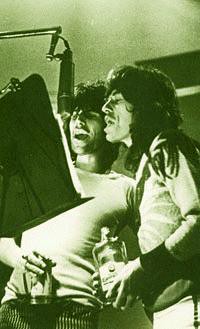"I want to thank all the people at my label..."
 So last night I and another buddy of mine went to call on an old guitar player friend that we hadn’t seen in years. We were like the three Musketeers during our marauding singles days spending what little money we had on lost weekends of partying and recording music. While me and my buddy had gotten married, had kids, and slid in line along side millions of our peers in the white collar career world, our friend sort of faded from view. We’d receive some intel on him from time to time while he worked a few bartending gigs and set up a local wing joint for the owners, but never much beyond that. Then not too long ago, we heard that he and his brother had opened up a club in the Little Five Points section of Atlanta (Atlanta’s mini East Village type area).
So last night I and another buddy of mine went to call on an old guitar player friend that we hadn’t seen in years. We were like the three Musketeers during our marauding singles days spending what little money we had on lost weekends of partying and recording music. While me and my buddy had gotten married, had kids, and slid in line along side millions of our peers in the white collar career world, our friend sort of faded from view. We’d receive some intel on him from time to time while he worked a few bartending gigs and set up a local wing joint for the owners, but never much beyond that. Then not too long ago, we heard that he and his brother had opened up a club in the Little Five Points section of Atlanta (Atlanta’s mini East Village type area).We had dinner at a place across the street from his club and enjoyed a great time together recalling the silliness of our joint escapades only fifteen short years ago. It was when the conversation turned to the in’s and out’s of starting up and running a club in the city of Atlanta that our friend quickly became awash with frustration and anxiety as he filled us in on his trials and tribulations over the past five years. Starting a small business in a city as corrupt as ours can do that. If it’s not one city agency or another extorting his hard earned cash, it’s lazy no show employees that let him down on a semi-regular basis, but the biggest frustration of late comes from another direction entirely. A source that I have tacitly defended on another somewhat related issue. After hearing my friends tale, I have changed my mind. The source of my nightclub owning friend’s frustration? Record labels. Record labels and ASCAP.
Yes, it appears that what Bob Lefsetz has been telling us for a long time actually has more than a ring of truth to it. The labels are losing money so bad that they have resorted to sending out their legal goons to (no, not go after illegal file traders, I support their efforts there) go after night clubs that play live music and pinch owners for unpaid points allegedly owed to them for licensed music being played by bands performing in said club. That’s right, they want a piece for cover bands playing licensed music. They sent my friend an invoice for $3000 threatening legal action if he didn’t “settle” this account. The three words that come immediately to mind; WHAT THE FUCK?!

First of all, my friends club caters to real players. He gets some residual bookings from a larger venue down the street of up and coming talent and fills the rest of the stage time with other young unsigned incubating locals and other seasoned musicians. You won’t catch a cover band playing Maroon 5 songs anywhere near his place. He himself is quite an accomplished player and would never pour his heart and soul into a place that catered to drunken frat boys howling top 40 hits. Jeff Sipe, Jimmy Herring, Col. Bruce, Derek Trucks, and others have sat in on jam sessions at his club for cripes sake. There’s no ‘Louie, Louie” being played here trust me.
Second and unbeknownst to the dickheads at ASCAP and BMI, our buddy also happens to be an avid recording enthusiast and when he installed his clubs’ system he was sure to put in both multi-track and two track digital recording devices. He exclaimed to the two of us as he showed off his impressive setup, “I’ve recorded every show that’s ever played here”. When I put the two together I said to him, “Dude, tell those fuckers at BMI to go though all those recordings and let you know what you own them, it can’t be more than fifty bucks tops”, and it was then that the pure evilness of these asshole record labels becomes crystal clear. It’s all about scaring you into folding. It’s all about the small club owner having to decide what’s going to cost him more: letting the civil action play out for which he’ll have to pony up for his own legal expenses, or just paying the invoice (i.e. fine) and getting on with his life. This is what’s called being mother fucked.
He certainly doesn’t need my advice, but if I were him and had those recordings in my pocket I’d shurely be telling BMI to go fuck themselves. If they decide to persue legal action, bring the tapes to the hearing with a per hour attorney at your side and ask the court to demand BMI show how they came up with their figure of three grand. At the same time, offer BMI, the court, an arbitrator, etc… the tapes of all the shows. My friend is certain that a BMI rep has NEVER stepped foot in his club, nor an ASCAP agent for that matter. They are simply betting that because he hosts live music, the acts that have performed have played licensed music without permission. A scorched earth tactic used indiscriminately to see if they can make a quick buck.
While I still firmly believe in protection of intellectual property and remain steadfast in my opposition to illegally downloading music, I will never again stick up for the labels on any issue and now strongly wish for their hastened demise. Yes, it’s jihad on the big labels. Although I held them in contempt for years for their historical artist exploitation and indentured servitude, I’ve also thought they were a necessity from a filtering and artist incubation perspective. Now they can just fuck off into the air entirely.
First they go after guitar tab sites, now their extorting money from small business owners who support working musicians. The labels understand nothing about musicians, their fans, and the music they create and I hope their days are numbered.
KH, good luck my friend and give’em hell.






11 Comments:
I wish I could say that this tactic was only used by ASCAP and the like, but the truth is that this is a very common and time-honored business tactic. Scare people and see what you get. Sadly, most music people probably roll when they see a big corporation coming after them.
BTW, how sad is it that Atlanta needs to steal the name of its "cool" neighborhood from New York?
Atlanta has "Big" five points, and "Little" five points. I'd bet our big five points out dates your girlie five points all day long my friend.
Don't make me send the Plug Uglies down there to kick your Confederate ass.
Indeed, musicians who are at the club playing their OWN ORIGINAL MUSIC are entitled to royalties from the performance rights organizations. The club benefits from the music and thus pays the creator. It has NOTHING to do with cover songs vs. originals. If BMI reps a songwriter or publisher whose music gets played for the public, that songwriter deserves a royalty.
BMI is a non-profit and they certainly aren't goons (or some money hungry corporation). They collect on behalf of the writers and publishers! These guys are on our side!!!! Jeez.
Having live venues pay fees for music played on the premises is nothing new at all - and any club that has music must be licensed. It happens with the jukebox too. Radio stations have licenses, web sites should, etc. This is the ONLY way a professional songwriter gets paid, and should be considered part of the expense of running a venue.
It seems like part of the story is missing here... Your friend should be paying for the appropriate licenses to run his club. Would he complain about a liquor license too?
companies will sue for just about anything. i remember many years ago reading how red lobster was suing other restaurants over the term "popcorn shrimp" which they had originated in the early 70's. from what i can recall, red lobster was circulating "cease and desist" letters to every restaurant they could find in an attempt to build a case and set a precedent. the rest is foggy now...
Chrispy, help me out here...
He pays a fee for commercial replay of recorded music over the house system for pre-recorded music which covers licensing of CD spins and digital music service.
The live music which is played at the club is mostly all original jam music, but I can't say (and niether can he) for sure that a cover composition doesn't get played on a rare occasion, but an overwhelming majority of the music being played at this place is by the composers themselves for which they get a % of the door for. I don't understand why he'd owe BMI for anything other than non-orignal work.
I fully understand and support artists getting paid you know that, but I have a hard time reconciling the seemingly honorable role of BMI's service with the shotgun methodology of approaching my friend for payment. It seems like what I wrote, a way to see what they can get using fear.
Keep me honest here...
Perhaps I wasn't clear...
The money paid to the musicians as part of the door has nothing to do with royalties due a songwriter. Your friend cannot negotiate on behalf of songwriters. This is what BMI and ASCAP do.
As I said, any time a song is played in public the songwriter and publisher are entitled to a royalty if the song is registered with a performance rights organization. This is still true if the writer of the song is the one performing it.
86% of the money BMI collects goes back to songwriters. If it takes "fear" to get club owners to do what's right, so be it. But being ignorant of the law isn't an excuse.
If it's improv it probably doesn't matter. But if songs are being performed, you must have a license. It isn't "shotgun", anyone who runs a business that provides music should be aware of this and comply. Again, it's like having a liquor license.
This isn't BMI "suing" anyone. The fact that they're offering to settle probably means that he owes more than $3000.
Believe me, any professional performers that have been at his club are members of BMI or ASCAP, and I'll bet they're happy they are.
By the way, even if he pays BMI, he still has to get a license from ASCAP. You're right, it's confusing.
Genuinely appreciate the education here...
"As I said, any time a song is played in public the songwriter and publisher are entitled to a royalty if the song is registered with a performance rights organization. This is still true if the writer of the song is the one performing it."
Wow. That I did not know. I guy plays a song that he wrote, is paid for that performance, yet BMI/ASCAP are still owed a publishing vig.
Question: What happens if the writer/performers are NOT BMI/ASCAP members, is the vig still owed? I would bet not, but the fact that he has marquee guys coming to sit in with local up and comers actually works against him. Am I right?
The answer is clear. All bands must play original material.
At any rate it's a ridiculous notion that somebody should have to pay to, essentially, promote a song.
BMI is not entitled to the money, the songwriter is. BMI collects on behalf of the songwriter and sends the songwriter a check. So in essence your friend pays BMI who then turn around and pay the performer. BMI isn't pocketing the money - it goes to the writer. i don't see how anyone could think this is wrong. Again, BMI is non-profit.
This applies to songs registered with BMI - when you're a member and write something new you go to BMI's website and register the song, listing all the writers and the percentage of credit they get. So it's the registered songs that are important, not the actual membership in BMI (I'm a member and have never registered any of my songs because I'm dumb).
Bottom line - if you run a business and are using music to enhance said business you owe the writer of the songs a piece of the action.
Tony - the fact that there are marquee guys performing there may well be why the performance rights orgs even contacted him. I guess it's possible one of the performers hipped BMI/ASCAP to the fact that he didn't have the license.
Jackson, no one's paying to promote a song, they're paying the creator for the public performance of the song. If you ever write a hit you'll be VERY happy that this is how it works.
Sorry - I should have said "in essence your friend pays BMI who then turn around the pay the WRITER" (not the performer, unless of course the writer and performer are one and the same).
Post a Comment
<< Home